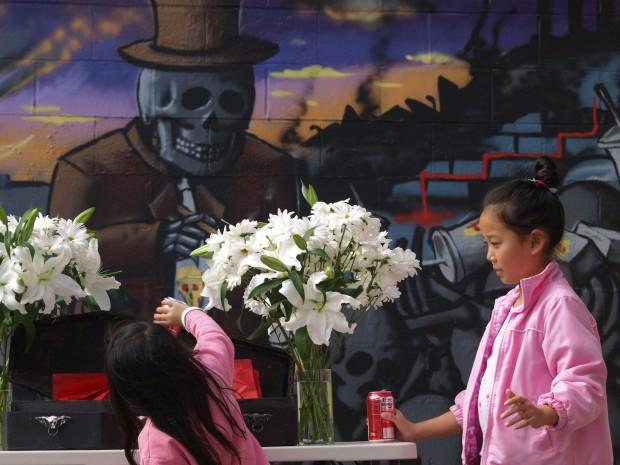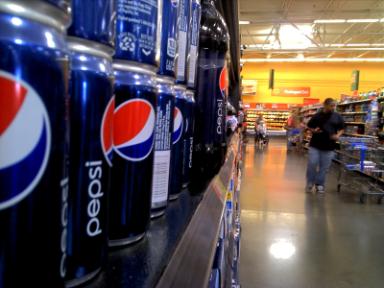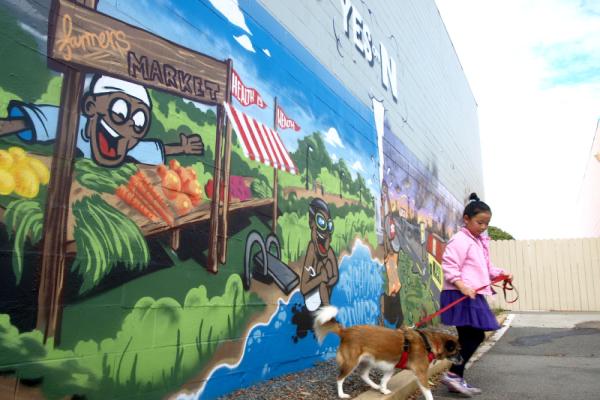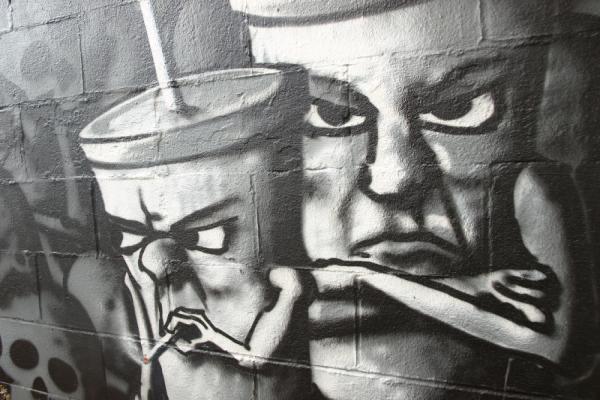October 24, 2012 News » Election 2012
The Richmond Soda War
Coke and Pepsi are pouring millions of dollars into the campaign against a proposed tax on sugary drinks in Richmond.
By John Geluardi
This year, Richmond may become the first city in the United States to combat its obesity epidemic by imposing a tax on sugary beverages. And the soda industry has been spending millions of dollars to crush the initiative for fear that it would set a national precedent and would ultimately slash its hefty profits.
The Richmond City Council put Measure N on the November 6 ballot in the hopes of creating opportunities for young people to exercise and learn about the value of a healthy diet. If voters approve the Soda Tax, it would levy a penny-per-ounce tax on sugar-sweetened beverages and is expected to raise an estimated $2 million to $4 million a year for anti-obesity programs.
Through September 30, the American Beverage Association, an industry trade group that includes Dr. Pepper, Coca-Cola, and PepsiCo, had spent $2.2 million in fighting Measure N with billboards, phone calls to voters, and political consultants. By comparison, the Fit For Life campaign, which backs the measure, had spent $25,293.
Proposed legislation against sugary drinks has popped up around the country in recent years. The America Beverage Association has spent another $1.3 million fighting a similar measure in the southern California city of El Monte. And New York City recently instituted a ban on large sodas and large sugary drinks at restaurants, street vendors, and movie theaters. A measure to tax sugary drinks in Philadelphia has twice failed to get voter approval.
The American Beverage Association argues the proposed Richmond tax would gouge the city's low-income residents and hurt small businesses. The group also contends the revenue from the tax measure might be misused because state law prevents the city from earmarking the money specifically for anti-obesity programs.
Richmond City Councilman Nat Bates, who often disagrees with the progressives on the council, vehemently opposes the ordinance. "This is a national issue and it should be addressed on a national level," Bates said. "It is not fair to Richmond business people. If there's an extra tax here, people are just going to go to El Cerrito, San Pablo, or Pinole to do their shopping."
Supporters of Measure N point to an increasing number of health groups and scientific studies that have linked soft drinks, which have no nutritional value, and other sugar-sweetened beverages to obesity. In addition, the concept of taxing sugary drinks has been endorsed by the United Nations, the American Heart Association, the American Medical Association, the New England Journal of Medicine, and others. In 2009, Dr. Thomas Frieden, now the director of the Centers for Disease Control and Prevention, argued in the medical policy journal Health Affairs that a sugar-sweetened beverage tax is "the single most effective measure to reverse the obesity epidemic."
Richmond Councilman Jeff Ritterman, the chief sponsor of the measure, has seen first-hand the ill effects of obesity on health. He is the former chief of cardiology at the Kaiser Richmond Medical Center where he treated patients suffering from obesity-related heart disease. "There is more and more science and the health news continues to build on our side," Ritterman said. "The only doctor they have on their side is Dr. Pepper."
In fact, the American Beverage Association doesn't deny the science behind the proposed ordinance, but rather the law's effectiveness in reducing obesity, said Chuck Finnie, vice president of the political consulting firm Barnes Mosher Whitehurst Lauter & Partners. "What we dispute is that taking money out of people's pockets through a tax and putting that money in the general fund and saying, 'Trust us to spend it in the fight against obesity,' is not the way to achieve it."
But the fact that the industry does not deny soft drinks are directly related to obesity and poor health raises moral questions about the industry's aggressive marketing to young people, Ritterman argued. According to the Federal Trade Commission, the manufacturers of carbonated soft drinks directed 96 percent of their advertising budget in 2006 — $474 million — at adolescents between the ages of twelve and seventeen. Of that, nearly $30 million was spent on targeting specific ethnic groups. "They basically try to get children hooked on a product that causes disease and death, and I think it's immoral," Ritterman said.
Obesity is at epidemic proportions in the United States, according to the National Centers for Disease Control and Prevention. The condition, which is related to poor diet and lack of exercise, is a major factor for chronic illnesses such as heart disease, stroke, diabetes, some cancers, and numerous other conditions. According to the report by UCLA researchers, "Bubbling Over: Soda Consumption and its Link to Obesity in California," an adult who drinks one or more cans of soda daily is 27 percent more likely to be overweight or obese, and men are 20 percent more likely to have a heart attack.
In Richmond the problem is acute. According to a 2011 study by the Contra Costa County Health Services, Richmond residents are more likely to die from obesity-related illnesses than residents in other parts of the county.
And Richmond school children have a weight problem: 52 percent of the city's school children are obese or overweight, which is 8 percent higher than the state average. As the city's children become adults, the obesity rates in Richmond are projected to rise to 42 percent from its current rate of 24 percent.
Ritterman said that means a lot of disease and early death. "When you think about this issue, you have to think about the children. The challenge is to make the science known so the public can make informed decisions," Ritterman said. "Richmond is planning an $89,000 program that will teach every third grader how to swim, and Measure N can help fund that and other programs."
Contact the author of this piece, send a letter to the editor, like us on Facebook, or follow us on Twitter.
Richmond residents say goodbye to soda at Measure N campaign event

Sisters Ally Chiang and Emma Chiang pour soda into a mock casket at a campaign event on Macdonald Avenue. (Photo By: Tawanda Kanhema)
By Tawanda KanhemaPosted 1 hour ago
Measure N campaign

Measure N campaign has drawn more than $2.2m since January.
A frozen bottle of Coca Cola rolled, fizzed and melted as it lay cold in a miniature casket mounted on a table at the corner of Richmond’s Macdonald Avenue and 37th Street. Residents, some in dark glasses, filed past and poured cans of soda into the cardboard casket, flooding the cold mass before dumping it into a trash can.
“We are saying goodbye to something unhealthy, something we don’t need,” said Jenny Wang, a public health worker and organizer of the ‘soda funeral’, a campaign event held to support the city’s measure to impose tax on sugar-sweetened beverages. “We are dumping soda, the message is one less can of soda for everyone.”
Around a dozen people showed up for the event, held in front of a newly unveiled 25-by-10 foot “Yes on N” mural that depicts Richmond as a city divided between powerful corporations, represented by Chevron and beverage manufacturers, and residents at farmers’ markets and in sports fields.

Mural depicts a city divided between corporate interests, represented by Chevron and beverage manufacturers, and residents. (Photo – Tawanda Kanhema)
“I am so angry we are getting all these mailers funded by people from out of town who care nothing about Richmond,” Wang said, as she washed her hands after dumping nearly three cases of soda. “We are calling on all Richmond residents who care about the health of our children to join us in making sure that we reduce the consumption of soda, it’s unhealthy.”
Outnumbered and outspent by a factor of nearly 100 to 1 by the Community Coalition Against Beverage Taxes, funded by the American Beverage Association and Cinemark INC. USA, community groups and residents like Wang are grabbing at straws to sway public opinion in favor of Measure N.
”Just like the tobacco tax, it’s a tax to help people stay healthy,” said Brian Chiang, one of the residents who attended the event. “They are fighting against a tax that at most will at most raise $3 million a year in a very poor city.”
While the coalition against Measure N has spent more than $2.2 million, the Yes on N campaign spearheaded by Richmond City Councilman Jeff Ritterman and supported by individuals like Wang and community groups has spent $29,000. Wang’s ‘soda funeral’ cost $100 to organize, she said.

Soda cans, part of artist Mike Rich’s “Dunk The Junk” mural on Macdonald Avenue. (Photo – Tawanda Kanhema)
“Even if [Measure N supporters] lose, it is good for the city of Richmond to start a fire that will spread to other cities,” Wang said. “They may have spent $2 million on this election, and they might even spend more next time, but we want to raise awareness, we will do it again and continue to push.”
At the end of the day, Wang and group of family friends and residents tossed the soda cans and handed out apples, peaches and bouquets of roses.



